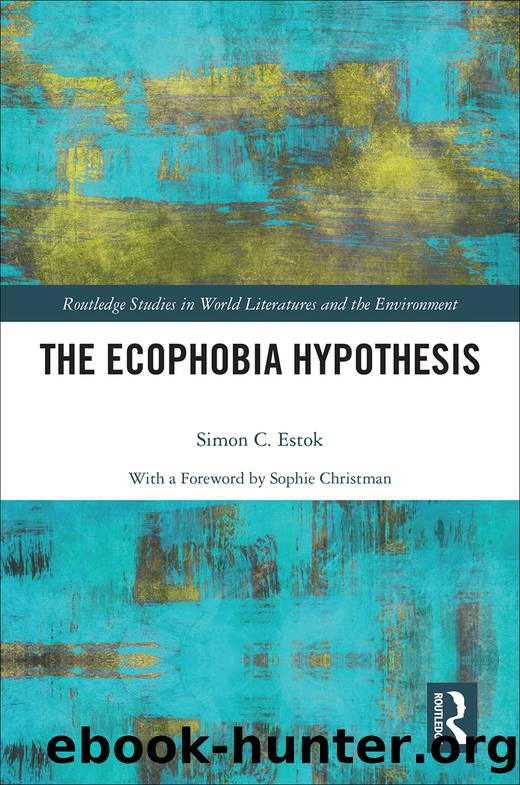The Ecophobia Hypothesis by Simon C. Estok

Author:Simon C. Estok
Language: eng
Format: epub
Publisher: Taylor & Francis (CAM)
Published: 2018-08-15T00:00:00+00:00
5 Animals, Ecophobia, and Food
Food is a rich site through which to think about a number of things: environment, colonialism, culture, affect, subjectivity, among others.
(Lisa Szabo-Jones 207)
Ecophobia emanates from anxieties about control, and nowhere is worldwide control of the natural environment more evident than in what Tony Weis calls the âmeatificationâ of global diets (4). With astonishing evidence and impeccable logic, Weis argues that detailing the costs of the global livestock industry âmight not only provide a means to understand the burden of industrial animal production but also as a lens through which to see the violence of capitalism as world-ecology, a totalizing way of organizing natureâ (154). The very concept of the fully industrialized nation has at its core an ethics of meat. Weis explains that âthe meatification of diets has long been a marker of class ascension and a dietary aspiration of development, from British lords to US suburbia to Chinaâs burgeoning elites and middle classâ (150). The most recent Organization for Economic Co-operation and Development (OECD) statistics available show that the average American ate 200.6 pounds (91 kilograms) of meat (beef, veal, poultry, pork, and sheep) in 2013, compared with the per capita consumption of 107.6 pounds (48.8 kilograms) in China (see McCarthy). In 1996, the United States consumed 195.7 pounds (89.2 kilograms) per capita, while China consumed 8.4 pounds or 3.8 kilograms (see âMeat Consumption Per Capitaâ). The American increase is a mere 2.4%, while the Chinese increase is an astounding 1,180.95% jump. Meat consumption in industrialized countries does not promise a good future for the environment.
Meat represents the ecophobic condition at its most global extreme because of the absolute nonchalance toward natureâs non-human bodies that are desecrated in the industrial-meat industry. As the editors of The Guardian somewhat tiredly explain,
links between meat consumption and climate change have been widely known for many years, partly due to deforestation in the Amazon rainforests to make room for livestock. Clearing these forests is estimated to produce a staggering 17% of global greenhouse gas emissions, more than the entire transport sectorâ.
(see âMeat Consumption Per Capitaâ)
Download
This site does not store any files on its server. We only index and link to content provided by other sites. Please contact the content providers to delete copyright contents if any and email us, we'll remove relevant links or contents immediately.
Invention by James Dyson(777)
The Ten Equations That Rule the World by David Sumpter(716)
Thinking Better by Marcus du Sautoy(714)
Concepts of Space by Jammer Max;(686)
God and the Multiverse by Victor J. Stenger(665)
Wanting by Luke Burgis(658)
Merchants of Doubt by Erik M. Conway(649)
How We Got to Now by Steven Johnson(636)
Factfulness by unknow(608)
The Surrender Experiment by Michael A. Singer(587)
The Smallest Lights in the Universe by Sara Seager(537)
On Creativity by Bohm David(537)
Floods, Famines, and Emperors: El Nino and the Fate of Civilizations by Brian Fagan(503)
Ancient Knowledge Networks by Eleanor Robson;(498)
Why Birds Matter by University of Chicago Press(496)
The Scientist and the Psychic by Christian Smith(494)
The Science of Being Lucky: How to Engineer Good Fortune, Consistently Catch Lucky Breaks, and Live a Charmed Life by Peter Hollins(482)
The Oxford Handbook of Philosophy of Mathematics and Logic by Stewart Shapiro(468)
Flood by Design (Design Series) by Mike Oard(442)
